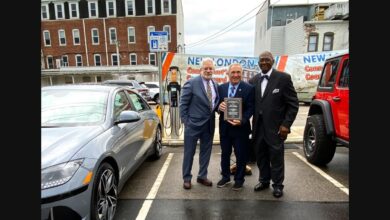Volt(e)-face! How motorist took on electric car giant… and won

By Ashlie Mcanally For The Scottish Mail On Sunday
22:32 04 May 2024, updated 22:32 04 May 2024
It’s an issue that can drive electric vehicle owners round the bend – how far can they travel on a fully charged battery?
More to the point, what recourse is there if it doesn’t perform as well as expected?
Now drivers have a new champion in the form of Scots motorist Sean Ross.
The 31-year-old was so disgruntled with the range of his Audi E-Tron he took the matter to the Financial Ombudsman – and won.
In a victory that could open the door for similar complaints, Mr Ross was given his deposit back by way of compensation and allowed to return the car.
After reading sales material and speaking to a salesman, Mr Ross bought a two-year-old electric car from a branch of Arnold Clark for £41,399 in November 2022.
Based on information provided, he expected to get around 150 miles on a full charge.
But within two days he complained he wasn’t getting that sort of range.
He was told to give it a few weeks until the car ‘learned how he drives’, but the issue continued.
The car was taken in for inspections and tests on three occasions in 2023. However, unimpressed, Mr Ross referred the matter to the ombudsman.
The watchdog concluded: ‘I don’t think Mr Ross was adequately informed about the real-life range he’d be able to achieve.
He ought to have been clearly informed the range is based on the usable battery, and the battery would not perform the same as if it was new.’
Reacting to the decision, Stuart Cochran, principal lawyer at Slater and Gordon, said: ‘Mr Ross was allowed to return his vehicle and was awarded compensation.
If there are a large number of people who have also not been adequately informed about the real life range of vehicles, then there certainly is the potential for a class action.’
In the decision, the ombudsman noted Mr Ross had complained ‘within a couple of days of being supplied the car’.
The watchdog added: ‘Had he been adequately informed I don’t think he’d have acquired the car.
That in itself would be sufficient to uphold the complaint.
But in addition, there’s also evidence there are faults with the car.
‘There have been repairs carried out. And Mr Ross says there’s still fault codes present.
‘He’s also supplied evidence that some of those faults may affect range and/or performance.
I don’t think a reasonable person would have expected those sorts of faults given the car [was around] two years old when it was supplied, and it had only covered around 23,600 miles and it cost more than £41,000.’
It isn’t the first time the advertised range of electric vehicles has been questioned. A probe by What Car? found manufacturers’ lab tests gave a misleading indication of battery life.
The motoring magazine reported a shortfall of up to 38 per cent in the range of electric vehicles in low temperatures compared with official data.
Mr Ross said: ‘I would encourage others to review the marketing material they were provided with to consider if they were mis-sold.’
An Arnold Clark spokesman said: ‘We always aim to provide our customers with the correct information to allow them to make an informed purchase.’



